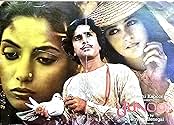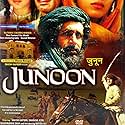Aggiungi una trama nella tua linguaSet during the 1857 War of Independence, an obsessed Indian Nawab desires to wed a young Anglo-Indian woman, but the girl's obstinate mother stands between them.Set during the 1857 War of Independence, an obsessed Indian Nawab desires to wed a young Anglo-Indian woman, but the girl's obstinate mother stands between them.Set during the 1857 War of Independence, an obsessed Indian Nawab desires to wed a young Anglo-Indian woman, but the girl's obstinate mother stands between them.
- Premi
- 7 vittorie e 2 candidature
Foto
Trama
Lo sapevi?
- QuizShashi Kapoor wanted to make good cinema, so he made Junoon, Kalyug, Vijeyta and Utsav which were very appreciated and also won awards from even foreign countries but Shashi Kapoor lost all his money on these films and put him in debt. Then later he made a completely commercial film Ajooba. Ajooba bombed and he went further in to debt
Recensione in evidenza
Summary: Set during the 1857 War of Independence, an obsessed Indian feudal chieftain desires to wed a young Anglo-Indian woman, but the girl's obstinate mother stands between them.
Junoon (aka "The Obsession") is a 1978 Hindi feature film directed by renowned Indian filmmaker Shyam Benegal. Junoon, produced by Shashi Kapoor, is a lost gem that deserves more attention than it has received over the last three decades. Based on a novella named A Flight of Pigeons by the one and only Ruskin Bond, Junoon presents the haunting tale of love, obsession, jingoism and death set around the Indian Mutiny of 1857. The movie underlines the atrocities of war while simultaneously trying to grapple with various social, moral and political issues that are as relevant today as they were in pre-independence India. This National Award-winning film has an ensemble star cast that includes Jennifer Kendal, Shabana Azmi, Nafisa Ali, Kulbhushan Kharbanda, Naseeruddin Shah, and Shashi Kapoor. The movie's prologue and epilogue is narrated by Amrish Puri in his trademark baritone voice.
Shyam Benegal and team need to be applauded for bringing Ruskin Bond's poignant tale to life. The movie's attention to period detail is immaculate. Benegal also succeeds in eliciting strong performances from all his actors. While the movie's real highlight is Shashi Kapoor's breathtaking performance, it would be unjust to overlook the other performances, especially those of Jennifer Kendal, Naseeruddin Shah, Shabana Azmi, Kulbhushan Kharbanda, and Nafisa Ali, who as the young Ruth Labadoor is a sight for the sore eyes. Vanraj Bhatia's music immensely adds value to the movie's poignant, sombre tone. Govind Nihalani's cinematography speaks for itself: the vivid and powerful images enrich the movie with an element of realism which woos the viewers into believing as if they are a part of the history. The history unfolds with a subtle element of drama that keeps monotony at bay but at the same time ensures that it doesn't become melodramatic.
Benegal, by the virtue of his groundbreaking cinematic works in the '70s and the '80s, rightfully established himself as the undisputed heir to the legacy of great Indian auteurs, like Satyajit Ray, Ritwik Ghatak, Guru Dutt, Bimal Roy, Tapan Sinha, Chetan Anand, Mrinal Sen, V. Shantaram, and Khwaja Ahmad Abbas, whose avant garde works paved the way for a new movement in Indian cinema during the late '40s to the '60s, popularly known as Indian New Wave or Parallel Cinema. Benegal's first four films viz. Ankur (1973), Nishant (1975), Manthan (1976) and Bhumika (1977) created a strong buzz among the Indian film aficionados and that's what brought him in contact with Shashi Kapoor who went on to back his next two projects (Junoon happened to be the first with the 1981 classic Kalyug being the second).
Shashi Kapoor is breathtaking to watch in the lead role of a love-struck feudal chieftain, Javed Khan, who falls for a young British girl. This, in the opinion of this critic, also happens to be Kapoor's best performance ever. What makes the portrayal special is its deceptive simplicity. It may be a cinch to play a madman but it's exceedingly challenging to play a role that lies mid-way between sanity and madness. An actor is required to muster all his talent to bring such a complex caricature to life and that's exactly where Kapoor triumphs. During the course of his portrayal, Kapoor effortlessly goes through a gamut of emotions, thereby making it quite convincing for the viewer.
Kapoor, having played pivotal roles in blockbusters like Deewaar, Trishul, Namak Halaal, and Shaan, is often hailed in as an acting icon as far as commercial cinema is concerned, but it's his lesser know art house endeavors, both as an actor and a producer, like Shakespeare-Wallah, Junoon, Kalyug, 36 Chowringhee Lane, Jinnah, etc. that make him stand out among his contemporaries. In fact, Kapoor, throughout his career, has been a part of an elite list of actors who can be said to have been actively associated with both the commercial and the parallel streams of Indian cinema (not to mention his indelible contribution to Indian theatre through his lifelong association with Prithvi Theatre, which he started in memory of his father Prithviraj Kapoor). Thus, it wouldn't be wrong to call him the John Cassavetes of India cinema.
Overall, Junoon is a cinematic epic which serves as a powerful eye-opener for the contemporary Indian filmmakers who, blinded by the glitz and glamour of Bollywood, seem to lack both the ideas and the resolve needed to make great cinema. A major area where the movie scores heavily is in its balanced use of visuals and dialogues. Junoon has several memorable scenes, but none matches the raw power of the opening sequence featuring a dervish, a Sufi Muslim ascetic, slowly drifting into a state of Wajd (a fit of ecstasy which produces a rhythmic motion of the body) upon getting enchanted by a Qawwali (a popular form of Sufi devotional music often sung in the praise of the Almighty) commemorating the glorious Sufi order. Junoon is a great means to get acquainted with classic Indian cinema. It's a must watch for anyone who understands and admires topnotch world cinema.
(This review was first published at A Potpourri of Vestiges)
Junoon (aka "The Obsession") is a 1978 Hindi feature film directed by renowned Indian filmmaker Shyam Benegal. Junoon, produced by Shashi Kapoor, is a lost gem that deserves more attention than it has received over the last three decades. Based on a novella named A Flight of Pigeons by the one and only Ruskin Bond, Junoon presents the haunting tale of love, obsession, jingoism and death set around the Indian Mutiny of 1857. The movie underlines the atrocities of war while simultaneously trying to grapple with various social, moral and political issues that are as relevant today as they were in pre-independence India. This National Award-winning film has an ensemble star cast that includes Jennifer Kendal, Shabana Azmi, Nafisa Ali, Kulbhushan Kharbanda, Naseeruddin Shah, and Shashi Kapoor. The movie's prologue and epilogue is narrated by Amrish Puri in his trademark baritone voice.
Shyam Benegal and team need to be applauded for bringing Ruskin Bond's poignant tale to life. The movie's attention to period detail is immaculate. Benegal also succeeds in eliciting strong performances from all his actors. While the movie's real highlight is Shashi Kapoor's breathtaking performance, it would be unjust to overlook the other performances, especially those of Jennifer Kendal, Naseeruddin Shah, Shabana Azmi, Kulbhushan Kharbanda, and Nafisa Ali, who as the young Ruth Labadoor is a sight for the sore eyes. Vanraj Bhatia's music immensely adds value to the movie's poignant, sombre tone. Govind Nihalani's cinematography speaks for itself: the vivid and powerful images enrich the movie with an element of realism which woos the viewers into believing as if they are a part of the history. The history unfolds with a subtle element of drama that keeps monotony at bay but at the same time ensures that it doesn't become melodramatic.
Benegal, by the virtue of his groundbreaking cinematic works in the '70s and the '80s, rightfully established himself as the undisputed heir to the legacy of great Indian auteurs, like Satyajit Ray, Ritwik Ghatak, Guru Dutt, Bimal Roy, Tapan Sinha, Chetan Anand, Mrinal Sen, V. Shantaram, and Khwaja Ahmad Abbas, whose avant garde works paved the way for a new movement in Indian cinema during the late '40s to the '60s, popularly known as Indian New Wave or Parallel Cinema. Benegal's first four films viz. Ankur (1973), Nishant (1975), Manthan (1976) and Bhumika (1977) created a strong buzz among the Indian film aficionados and that's what brought him in contact with Shashi Kapoor who went on to back his next two projects (Junoon happened to be the first with the 1981 classic Kalyug being the second).
Shashi Kapoor is breathtaking to watch in the lead role of a love-struck feudal chieftain, Javed Khan, who falls for a young British girl. This, in the opinion of this critic, also happens to be Kapoor's best performance ever. What makes the portrayal special is its deceptive simplicity. It may be a cinch to play a madman but it's exceedingly challenging to play a role that lies mid-way between sanity and madness. An actor is required to muster all his talent to bring such a complex caricature to life and that's exactly where Kapoor triumphs. During the course of his portrayal, Kapoor effortlessly goes through a gamut of emotions, thereby making it quite convincing for the viewer.
Kapoor, having played pivotal roles in blockbusters like Deewaar, Trishul, Namak Halaal, and Shaan, is often hailed in as an acting icon as far as commercial cinema is concerned, but it's his lesser know art house endeavors, both as an actor and a producer, like Shakespeare-Wallah, Junoon, Kalyug, 36 Chowringhee Lane, Jinnah, etc. that make him stand out among his contemporaries. In fact, Kapoor, throughout his career, has been a part of an elite list of actors who can be said to have been actively associated with both the commercial and the parallel streams of Indian cinema (not to mention his indelible contribution to Indian theatre through his lifelong association with Prithvi Theatre, which he started in memory of his father Prithviraj Kapoor). Thus, it wouldn't be wrong to call him the John Cassavetes of India cinema.
Overall, Junoon is a cinematic epic which serves as a powerful eye-opener for the contemporary Indian filmmakers who, blinded by the glitz and glamour of Bollywood, seem to lack both the ideas and the resolve needed to make great cinema. A major area where the movie scores heavily is in its balanced use of visuals and dialogues. Junoon has several memorable scenes, but none matches the raw power of the opening sequence featuring a dervish, a Sufi Muslim ascetic, slowly drifting into a state of Wajd (a fit of ecstasy which produces a rhythmic motion of the body) upon getting enchanted by a Qawwali (a popular form of Sufi devotional music often sung in the praise of the Almighty) commemorating the glorious Sufi order. Junoon is a great means to get acquainted with classic Indian cinema. It's a must watch for anyone who understands and admires topnotch world cinema.
(This review was first published at A Potpourri of Vestiges)
- murtaza_mma
- 29 mag 2015
- Permalink
I più visti
Accedi per valutare e creare un elenco di titoli salvati per ottenere consigli personalizzati
Dettagli
- Data di uscita
- Paese di origine
- Lingue
- Celebre anche come
- A Flight of Pigeons
- Azienda produttrice
- Vedi altri crediti dell’azienda su IMDbPro
- Tempo di esecuzione2 ore 21 minuti
- Mix di suoni
Contribuisci a questa pagina
Suggerisci una modifica o aggiungi i contenuti mancanti

































